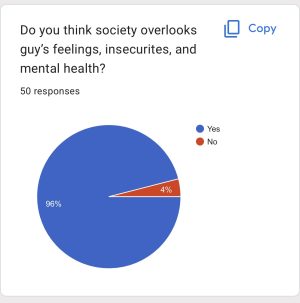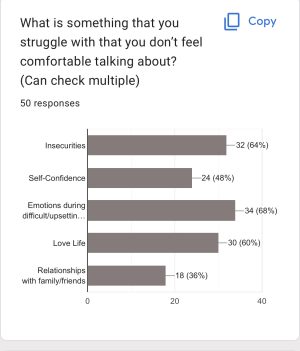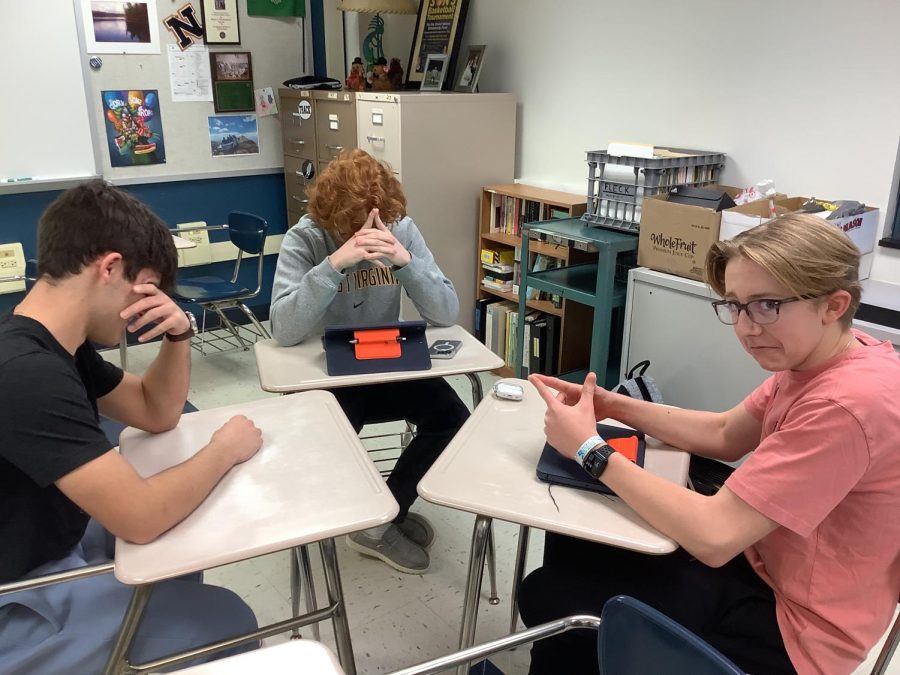Guys’ Mental Health: Gender Equality goes both ways
According to The Mental Health Foundation, around one in eight men have a common mental health problem, and three times as many men as women die by suicide.

Mental health has been a subject of concern for both genders, but there has been a divided conversation debating whether or not girls’ mental health is advocated more than guys’ mental health. Regardless of where the encouragement for girls’ mental health is displayed, studies show that the negative connotation of guy’s discussing their mental health, and the lack of resources available to promote it, affects the decision for guys who are struggling to reach out for help. This problem is no different for the guys at Norwin High School, and there should be an imminent discussion about how the stigma associated with guys’ mental health can cause harm to males all around the world.
According to the British organization whitworth chemists.co.uk, “One of the biggest reasons for this is the stigma associated with mental health problems. Men believe they are expected to be ‘the strong one.’ They believe that they shouldn’t show emotions and that they should just deal with whatever they are feeling.”
In a recent Norwin journalism poll of over 50 male students, 82 percent of guys believed that eliminating stereotypical assumptions made about guys’ mental health would make guys feel more comfortable to reach out for help.
The expectation put on guys compared to girls on how they deal with mental health is an important factor when considering why guys tend to reach out for help less than girls.
“I tend to see more girls than guys in regards to mental health,” said Kimberly Thorsen, a Norwin High School guidance counselor. “There are a handful of guys who will come to talk about their struggles but I do see less guys and more girls.” I do think there is a stigma associated with mental health and there is a perception that guys should be able to handle things differently than girls.”
Oftentimes, this negative perception is heavily caused by social media, or say, what is not included in social media to help promote guys’ mental health.
The chemists of Whitworth Pharmacy also connected mental health with social media. “They also tend to feel ashamed about the way they’re coping and see themselves as being weak, vulnerable, or worthless because of the way they feel. The fact that they aren’t living the glamorous lives they see filling their Instagram or Facebook feeds only makes matters worse. This means they’re even less willing to open up.”
Thorsen also believes that society affects the perception around guys’ mental health.
”I feel like society has an impact on any student’s decision to reach out for help,” said Thorsen. “I do see more girls versus guys so it seems like there is a certain expectation that guys should be able to handle their mental health without needing help.”
Not only do Norwin High guidance counselors believe that society has an effect, so do students at the school.
On the Norwin Poll when guys were asked if they believe society currently does anything that positively promotes mental health in general, one male student at Norwin High School said, “No not really. Mental health care sounds like you’re clinically insane and not just anxious or depressed, and even then if a man says that he needs this help and starts crying it’s genuinely viewed negatively.”
This societal standard prevents guys from discussing their mental health, and this is vital when there are various different struggles that guys can be dealing with.

In the Norwin poll as well, the male students checked various struggles that they felt uncomfortable about: 34 checked “emotions during difficult and upsetting times”/ 32 checked “insecurities”/ 30 checked “love life”/ 24 checked “self-confidence”/ and 18 checked “relationships with family and friends.”
The numerous struggles that guys deal with shows the extent to which guys do require resources to help, but the scarcity of those who do ask for help can create problems for themselves and the people around them.
A study executed by APA’s Journal of Abnormal Psychology showed that women with anxiety disorders are “more likely to internalize emotions, which typically results in withdrawal, loneliness and depression.” Men, however, are “more likely to externalize emotions, which leads to aggressive, impulsive, coercive, and noncompliant behavior.”
In order to prevent guys from hurting themselves or others from dealing with mental health, Norwin male students suggested multiple ways for society to encourage guys to reach out for help.
On the Norwin poll, besides eliminating stereotypical assumptions made about mental health, many male students suggested other ways to help guys deal with their mental health such as creating time to privately talk to trusted peers or creating clubs that allow guys to relate in whatever they are dealing with.
There are many factors, including society and social media, that stear guys away from asking for help with their mental health. Not only is this a current and ongoing problem to the male students at Norwin High School, but to males all across the globe, even including NFL football players.
In the recent Bills vs. The Bengals game, Buffalo Bills’ Damar Hamlin suffered a cardiac arrest after being hit. Players, coaches, and fans hugged, cried, and prayed for Hamlin. Green Bay Packers quarterback Aaron Rodgers stepped up to the NFL, questioning their thought to continue the game, and justifying the reasonable reactions brought about by the rest of the male players.
“I just think you maybe have an open forum to allow guys to share their emotions,” said Rodgers. “I think as men sometimes, we’re so conditioned maybe to suppress everything, to just put on a good face and, ‘We’re going to tough through this.’ I don’t really think that’s the approach.”
It is undoubtedly obvious that a guys’ mental health is focused on a great deal less than it should be. The fight to have to remove the stigma associated with a guy’s mental health and to encourage males around the globe to reach out for help shows the consistent discrepancy that gender equality can go both ways. If you or anyone you know is currently struggling with mental health, please use school guidance counselors, friends, or family to seek help.
If you or someone you know does not feel comfortable talking to someone, there are anonymous sources such as online therapy through video calls or simply texting. If there is a current life threatening situation, call the suicide and crisis lifeline at 988 or your local police at 911. Go to https://www.mentalhealth.gov for help or more information.

Miya is a second-year senior writer of the Knight Krier and Newspaper. She is largely involved with the Norwin High School Community as President of Honors...







